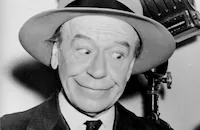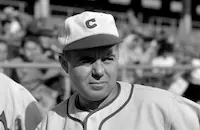Maisie Goes to Reno

Brief Synopsis
Cast & Crew
Harry Beaumont
Ann Sothern
John Hodiak
Tom Drake
Marta Linden
Paul Cavanagh
Film Details
Technical Specs

Synopsis
After she becomes embroiled in a noisy fight with her factory mate, Maisie Ravier, an overworked Los Angeles riveter who has developed a nervous wink, is ordered to take two weeks of vacation. Hearing of Maisie's situation, Tommy Cutter, a band leader with whom Maisie used to perform, offers her a job singing with his all-girl band in a Reno hotel, and tempted by the promise of free room and board, she accepts. Because of the war, bus tickets to Reno are scarce, and Maisie obtains one only by chance. When Bill Fullerton, a Marine sergeant on furlough, begs her for the ticket so that he can go to Reno and reconcile with his estranged wife Gloria, an heiress who believes he is a fortune hunter, Maisie gives it to him. Before boarding the bus, however, Bill is informed by an M.P. that his furlough has been canceled. Desperate, Bill returns the ticket to Maisie and asks her to hand-deliver a letter he was written to Gloria. Once in Reno, Maisie inquires about Gloria, who is staying at her hotel, but learns that the heiress has checked out. Mistaking her nervous tic for a flirtation, Philip "Flip" Hennahan, a blackjack dealer at the hotel's casino, offers Maisie a ride to the ranch where Gloria is now staying. There, Maisie is introduced to Gloria by her business manager, Roger Pelham, and hands over Bill's letter. To Maisie's surprise, Gloria is unmoved by the letter and reveals that Bill has written to ask for money. The next morning, Bill telephones Maisie to inquire about the letter, and she condemns him as a deceitful cad. Maisie then spends a romantic day with Flip and learns that he is a recently discharged veteran. That night, Maisie runs into Gloria at the hotel, but soon discovers that the woman is actually Gloria's secretary, Winifred Ashbourne. The real Gloria then introduces herself, explaining that she sometimes has Winifred impersonate her. The heiress sadly denounces Bill, unaware that Winifred and Pelham replaced Bill's letter with one penned by an alcoholic forger named J. E. Clave. Soon after, Maisie overhears Clave talking on a lobby phone to Pelham and, suspicious, tricks Jerry, a bellhop who is infatuated with her, into letting her deliver to Clave a note from Pelham. Posing as a flirtatious, hard-drinking con artist, Maisie tries to cajole Clave into revealing facts about his criminal life, but even when drunk, the forger is tight-lipped. Finally, Clave passes out after signing a room service receipt with a phony name, and Maisie, deducing that he is a forger, steals his desk blotter, which contains some of his handiwork. Flip, meanwhile, has overheard part of Maisie's flirtation with Clave and assumes the worst. After an excited Maisie phones Bill and tells him she has proof that Winifred and Pelham are trying to force a divorce so that they can embezzle from Gloria, Bill agrees to come to Reno. She then goes to show Flip the blotter, and when she cannot find it in her purse, she accuses Flip of stealing it and storms out of his room. Bill, who is on his way to Reno, calls Maisie and tells her to do whatever she has to do to keep Gloria from going through with the divorce. Maisie is then confronted by Clave, Winifred and Pelham, who find the blotter in the lining of her purse and warn her to stop meddling in their business. When an excited Maisie tries to explain to Flip about the blotter, he concludes that she has had a nervous breakdown and arranges for her to see Dr. Cummings, a psychiatrist, the next morning. Before meeting with the doctor, however, Maisie and Jerry use a toy gun to kidnap both Winifred and Gloria from the crowded courthouse. When their getaway car blows a tire, they are caught by a policeman and brought to the nearest police station. There Winifred, Gloria, Flip and Dr. Cummings convince the police captain that Maisie is crazy. The captain finally agrees to release Maisie to Dr. Cummings' custody, but Maisie escapes from him when she sees Bill on the street. Bill and Maisie then race to the courthouse, and just before the judge is to hear Gloria's case, Bill convinces his wife that he loves her and that Winifred and Pelham have been hoodwinking her. After the judge stops the crooks from fleeing, Flip finally realizes that Maisie is sane and embraces her.

Director

Harry Beaumont
Cast

Ann Sothern

John Hodiak

Tom Drake
Marta Linden

Paul Cavanagh

Ava Gardner
Bernard Nedell
Roland Dupree
Chick Chandler
Bunny Waters

Donald Meek
Georgia Stark
James Warren
Douglas Morrow
William Tannen
Bernard Thomas
Celia Travers
Yvonne Severn
Billy Bletcher
William Hall

Ray Walker
Almira Sessions
Dick Rich
Tim Wallace

Anthony Caruso
Edward Earle
Joey Ray
Don Hayden
Ronnie Rondell

Ray Teal
Ralph Sanford
Larry Blake

Wally Cassell

Byron Foulger
Cliff Clark
Leon Tyler

John Hamilton
Noreen Roth
Dallas Worth
Lynne Arlen
Ethel Tobin
Elizabeth Dailey
Katharine Booth
Edith Leach
Leigh Delacy
Crew
Hugh Boswell
Howard Campbell
Harry Clork
Helen Conway
Sammy Fain
Ralph Freed
Cedric Gibbons
A. Arnold Gillespie
Irving Glassberg
George Haight
Frank E. Hull
Irene
Standish J. Lambert
Sammy Lee
Frank B. Mackenzie
Mary C. Mccall Jr.
M. J. Mclaughlin
James O'hanlon
Charles O'malley
Robert Planck
Howard E. Rogers
Harry Ruby
William J. Saracino
Douglas Shearer
Robert W. Shirley
David Snell
William Steinkamp
Michael Steinore
P. R. Stevens
John A. Williams
Edwin B. Willis

Film Details
Technical Specs

Articles
Maisie Goes to Reno
The supporting role of Gloria, the rich young war bride being conned by a couple of slick hucksters, was a very early talking part for Ava Gardner. Fresh off her brief first marriage to one of MGM's top stars at the time, Mickey Rooney, Gardner was in the process of establishing her presence at the studio as a contract player, but still a few years away from major stardom. Though her screen time is limited in Maisie Goes to Reno, Gardner makes the most of her role, and her extraordinary beauty shines through.
Ann Sothern sings one song in Maisie Goes to Reno - the rollicking number "Panhandle Pete" as part of Maisie's stage show.
Producer: George Haight
Director: Harry Beaumont
Screenplay: Mary C. McCall, Jr. (screenplay); Harry Clork, Howard Emmett Rogers (contributing writers, uncredited); Wilson Collison (characters); Harry Ruby, James O'Hanlon (story)
Cinematography: Robert Planck; William H. Daniels (uncredited)
Art Direction: Howard Campbeid, Cedric Gibbons
Music: David Snell; Robert Franklyn, Lennie Hayton, Bronislau Kaper (uncredited)
Film Editing: Frank E. Hull
Cast: Ann Sothern (Maisie Ravier), John Hodiak (Philip Francis 'Flip' Hennahan), Tom Drake (Sgt. Bill Fullerton), Marta Linden (Winifred 'Wini' Ashbourne), Paul Cavanagh (Roger Pelham), Ava Gardner (Gloria Fullerton), Bernard Nedell (J.E. Clave), Roland Dupree (Jerry (bellboy)), Chick Chandler (Tommy Cutter), Bunny Waters (Elaine).
BW-90m. Closed Captioning.
by Andrea Passafiume

Maisie Goes to Reno
TCM Remembers - Ann Sothern
TCM Remembers - Ann Sothern
Quotes
Trivia
Notes
Although records from the M-G-M Music Collection indicate that a second song titled "This Little Band Goes to Battle" was recorded for the film, it was not included in the final film. Maisie Goes to Reno marked director Harry Beaumont's first film since RKO's 1937 comedy When's Your Birthday? Hollywood Reporter news items add the following information about the production: In November 1943, Norman Z. McLeod was announced as the film's director. Hal Rosson was announced as cameraman in February 1944, and Doug Morrow and Lloyd Nolan were announced as possible stars. (Doug Morrow was eventually cast in a small part.) Hollywood Reporter production charts list William Daniels as the film's photographer, not Robert Planck, who is credited onscreen. Kathleen McCleon, whom Hollywood Reporter described as a "graduate of Ramona Convent in Alhambra," and Donald Curtis were both listed as cast members, but their appearance in the completed film has not been confirmed. For more information on the "Maisie" series, consult the Series Index and see entry for Maisie in the AFI Catalog of Feature Films, 1931-40; F3.2662.















